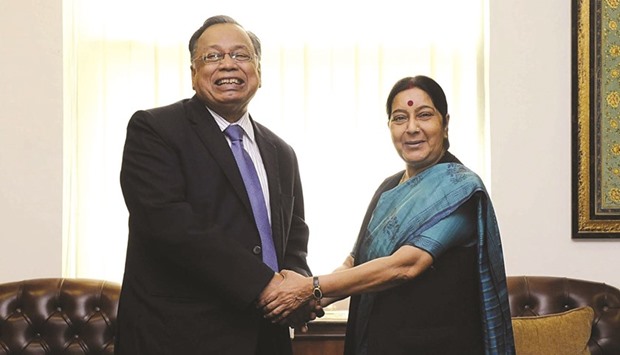India’s External Affairs Minister Sushma Swaraj held a meeting with Bangladeshi Foreign Minister Abul Hassan Mahmud Ali yesterday during which the two leaders discussed a number of bilateral issues.
“A valued neighbour, an important friend. EAM meets with Bangladeshi FM Abul Hassan Mahmud Ali,” external affairs ministry spokesman Vikas Swarup tweeted.
According to a report from Dhaka, a statement issued by the Bangladesh foreign ministry said the two ministers discussed various issues of Bangladesh-India bilateral relations, including water resources, trade and commerce, security and border
management.
It was also decided that the next meeting of the Joint Consultative Commission (JCC), co-chaired by the two ministers, will be held in Dhaka in July this year.
Yesterday’s meeting assumes significance because of the Bangladesh government’s clampdown on terrorist elements following the killing of a head priest of a Hindu temple in the country last month, the responsibility for which was claimed by the Islamic State (IS) terror outfit.
On Tuesday, Ali addressed the Raisina Dialogue in Delhi, a global conclave on geopolitics and geo-economics organised by the external affairs ministry and the Observer Research Foundation.
He called for integration of the South Asian nations, saying that the newly formed Bangladesh-Bhutan-India-Nepal (BBIN) sub-regional co-ordinative architecture would prove to be a game changer in the region.
Kumaratunga meets Swaraj: Sushma Swaraj held a meeting with former Sri Lankan president Chandrika Kumaratunga yesterday.
“Another old friend, from Sri Lanka. EAM @SushmaSwaraj meets former President Chandrika Kumaratunga,” external affairs ministry spokesman Vikas Swarup tweeted after Sushma Swaraj earlier on the day met with former Afghan president Hamid Karzai.
On Tuesday, Kumaratunga addressed the Raisina Dialogue, a global conclave on geopolitics and geo-economics organised by the external affairs ministry and the Observer Research Foundation.
In her address, she said that while co-operation and economic integration proceeded very fast in the rest of the world, economic integration in South Asia was very slow.
Lamenting that the India-Pakistan conflict prevented regional integration in South Asia, she, however, said that things were likely to change now with the rise of the post-Partition generation.

India’s External Affairs Minister Sushma Swaraj and her Bangladeshi counterpart Abul Hassan Mahmud Ali shaking hands during a meeting in New Delhi yesterday.
